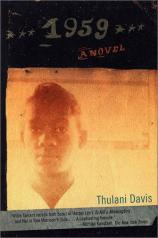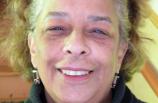Reading Group Guide
Discussion Questions
1959: A Novel

1. 1959 plays an important role in remembering the Civil Rights struggle and integration in the South—as an adult remembrance of 12-year-old Willie's coming-of-age in Virginia in the '50s and '60s. What does the age of the protagonist bring to the story that an adult might not have provided?
2. Although Willie is the primary protagonist in the story, at different times in the novel the point of view shifts to one of the adults like her father Dixon, or her mother's best friend Lillian. When does this happen? And why and to what effect do you think the author chooses to change the point of view at these times?
3. By page nine we learn of Willie's obsession with dictators—more precisely, Papa Doc in Haiti and Fidel Castro in Cuba. Both rebellions involved people of color overthrowing a white power class. In her discussion of Cuba, race is blurred, particularly when she likens Castro to Marlon Brando. Why is she so interested in dictators? Or is she more interested in how Cuba and Haiti have overthrown white rule? Is there any significance to the inclusion of this detail about Willie in the first few pages of the novel?
4. In the first half of the book, the mood fluctuates between calm and stormy fairly often. At some points complacency paired with hopelessness is the over-riding theme, at others, anger and hope. At what point does the novel completely change gears and become a more frenetic duel between these two themes? What fuels this shift? How do the characters and the chain of events sustain it?
Metaphorically speaking, one could describe the first four chapters of 1959 as the kindling. In Chapter Five, the fire is roaring. How does the change in pace of Davis' storytelling convey this?
5. Slavery as a part of history was suppressed as a memory by Dixon Tarrant's parents. "…For the most part slavery was something Charles and Louisa Tarrant talked about behind the doors, as if it were something the children shouldn't know had ever happened…" (p. 35). Why do you think the older generations chose to try and forget it? How did reclaiming it as an important part of Black American history help to fuel the civil rights struggles in the younger generation? How does the fact that Dixon grew up in between the denial and the renewed rage impact his personal attitudes?
6. The education of black men in the North proved to be an exercise in futility for men like barber Ralph Johnson. "Most of them agreed that if they weren't going to preach or bury folks it would be hard indeed to make a penny with their degrees." (p. 93) How did the different circumstances of Ralph Johnson and Dixon Tarrant (both of who went to college at the same time) impact their roles (and personal investments) in the fight for integration and equality in Turner?
7. On page 178, barber Ralph Johnson and some of his clients have an argument about the proper word to use to describe them. Discuss the gravity and meaning of words like "colored," "black" and "Negro" and why at different times some were more preferable or more objectionable than others. Why might someone prefer one to the other? Is there a right answer to this question? What does this suggest about the importance of words, and of naming, in the novel? Does this importance exist in the real world?
8. Farmer Calvin Murfree and his family live on the outskirts of Turner, in Plum Landing. His ruddy sunburnt complexion gives his outdoor profession away. During a heated discussion about race relations and integration with his friends Dixon Tarrant, Ralph Johnson, Coleman Boteler and others, he makes his cynicism apparent: "You can't expect anything from these white folks… We learned that here. We tried to integrate and they just shut it all down. 'Let your kids rot,' is what they said." (p. 93) He calls the white man "irrelevant" to the black man's situation (p. 94), and pronounces on page 95 that "all de quiet bull de butcher kill." What does Murfree mean in the last statement? What is his attitude towards white establishment and morality with regards to the treatment of Blacks? Why is integration an especially vexing issue for him? How does his position differ from those of his friends?
9. Are the novel's the noblest warriors are often the women? How grim a picture is painted of the male characters—both in relation to their infidelities and desires for "in-between-time women," and their unwillingness to commit to the cause of integration as wholeheartedly as women like Willie's aunt Maddie and her school teacher Mrs. Taliaferro? How is this theme carried out throughout the different male-female relationships in the novel? Why are the women more enraged?
10. Willie's Grandma Louisa was the keeper of secrets… the keeper of history… the keeper of peace about "what they wanted kept quiet." (p. 194) She was born free, the first in her family not born into slavery. When Willie visits her, Louisa talks nonstop about the past– passing on what little she can/is willing to remember. She even gives Willie her dead daughter Frannie's diary, knowing that if any of her other children found it after she was gone, they'd likely destroy it as unimportant. When Louisa dies, Willie feels "cut off at the limbs." (p. 196) What does this suggest to the reader about the importance of heritage, collective memory. elders and role models? Why does Willie feel "cut off," and what does this say about her perception of her elders' commitment to memory, history and legacy?
11. Dixon Tarrant is a widower raising two children on his own. It seems ever since his wife died, he could no longer be tough with Preston and Willie. This light hand of discipline forces both of them to be more grown up than they are— to make adult decisions as children (i.e., attending the integrated school). On page 228, Dixon confesses to his son Preston that Willie has made him finally realize what he's been "doing." What has Preston been doing? What is the significance of his phone call in the previous paragraph? Who is he calling… and to what end?
12. "Coleman Boteler had always felt he had something to say, something he could say, but it was ridiculous to say it." (p. 64) How does this one sentence explain the events to follow and Coleman's role in the "storm" of 1959-60 in Turner? Why does Coleman Boteler show up at the protest on page 233? What does his ongoing resistance and skepticism symbolize, if anything? Is this a turning point for him? Why or why not?
13. In Chapter Six, Professor Coleman Boteler is shot several times by cops and left for dead on the side of the road after being pulled over for speeding. (p. 286) When Coleman is first pulled over, he is not worried, as his tweed coat and nice car lend an air of "good nigger" to him, something that has helped him get past trouble on other occasions. However, this time the cops make trouble for Coleman and he loses his cool. They shoot him several times and roll him into a ditch— clearly unconcerned about the consequences. Why, instead of seeking justice, do his friends "fake" Coleman's death at the hospital and speed him out of town and back to Turner in a hearse? What does this really say about the "fight" for justice and equality in the South? (p. 289)
14. Music plays a large role in character development in the novel. Gospel, blues, jazz, and even Elvis' brand of rock-and-roll are woven into the descriptions of the various characters. The music is an essential method of distinguishing the different experiences, feelings and degrees of pride and rage each character embodies. Discuss how music helps to flesh out the characters of Willie's brother Preston Tarrant, Willie's father Dixon Tarrant (p. 34), the narrator Willie Tarrant, barber Ralph Johnson (p. 173), Willie's deceased aunt Frannie Tarrant, and intellectual Coleman Boteler (p. 63).
1959: A Novel
- Publication Date: September 2, 2001
- Paperback: 304 pages
- Publisher: Grove Press
- ISBN-10: 0802138314
- ISBN-13: 9780802138316







